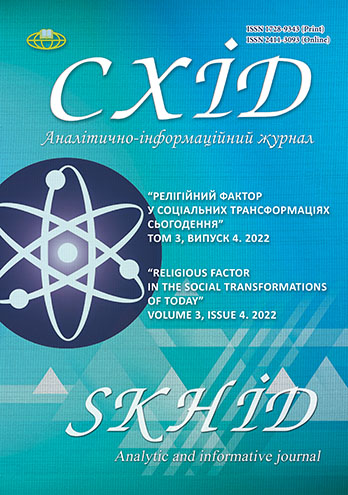Spiritual practices of zen buddhism in the conditions of globalization challenges of modern times
DOI:
https://doi.org/10.21847/1728-9343.2022.3(4).269723Keywords:
Zen Buddhism, spiritual practices, meditation, satori, za-zen, koan, wabi, sabiAbstract
The article studies the specifics of Zen Buddhism spiritual practices that influence the spread of their popularity in the contemporary Western globalised world. Zen Buddhism insists on the need for inner spiritual experience, which is directly opposed to authority and external revelation. Zen Buddhism primarily emphasises individual effort in overcoming the separation of the world into opposites, which is the result of the thinking activity. The difference between the religious system of Zen Buddhism is that Zen Buddhism, with its enlightenment, does not depend on sacred books and texts (as, for example, in Christianity, which formed the Western world system); Zen is also primarily non-verbal. The experience of enlightenment cannot be shared with others. Zen practice is a cultivated path, which at the same time has no ultimate goal or meaning; here the path (life in the inevitable) is already a "satori" here and now, which constantly flows through human existence. The relevance and novelty of the study are due to the highlighting of the features of spiritual practices of Zen Buddhism as a way of self-knowledge of a person, "returning to oneself", which ensures its active spread in modern Western society. It is determined that the essence of Zen Buddhism mysticism is that the most real is the abstract, and vice versa. The whole system of spiritual practices is the product of this essential inner spiritual experience. This mysticism often prevents us from measuring the depth of the Eastern mind in terms of Western rationalism because it denies logical analysis by its very nature. The Eastern mind is synthetic. It does not attach too much importance to insignificant trivialities. Still, it strives for an intuitive understanding of the whole, which reaches the spiritual philosophy of Zen in the daily practical challenges of the globalised world. The features of the influence of the spiritual system of Zen Buddhism on Japanese art are also analysed. The conclusions underline that Zen Buddhism has had a significant impact both directly on the religious and cultural life of the Japanese and world culture in general. The popularity of the spiritual practices of Zen Buddhism in Western society is due to their idea of breaking a person out of the subject-object dichotomy, which leads to the separation of the spiritual essence of man, and causes social conflicts. Zen has unique aesthetics, which include a high appreciation of moderation, asymmetry, imperfection, simplicity, and naturalness. In simple beauty and simplicity (transformation of "poverty" into a kind of minimalism), the Japanese find a unique charm and a source of true beauty.
Downloads
References
Breslavets, T. I. (1994). Ocherki yaponskoy poezii IX–XVII vekov. Moskow (in Russian).
Dumoulin, Heinrich. (2005a). Zen Buddhism: India and China. Vol. 1. World Wisdom, Inc.
Dumoulin, Heinrich. (2005b). Zen Buddhism: Japan. Vol. 2. World Wisdom, Inc.
Fromm, E. (2010). Dzen-buddizm i psihoanaliz [Zen Buddhism and Psychoanalysis] (рр. 215 – 313). In Po tu storonu poraboschayuschih nas illyuziy. Dzen-buddizm i psihoanaliz – Beyond the illusions that enslave us. Zen Buddhism and Psychoanalysis, Moskow, AST (in Russian)
Huxley, A. (2004). Zametki o dzen. [Zen notes] (рр. 47 – 55). In Antologiya dzen – Zen anthology, Sankt-Peterburg, Nauka (in Russian)
Hanh, Thich Nhat. (2016). The miracle of mindfulness, gift edition: An introduction to the practice of meditation. Beacon Press.
Kolesnyk, I. (2009). Probudzhennia v dzen-buddyzmi yak meta transformatsiinoho protsesu. Nauka. Relihiia. Suspilstvo. 3, 201 – 206 (in Ukrainian)
Kolesnyk, I. (2012). Dzen-buddyzm i Zakhid: fenomen adaptatsii relihii v kulturi. Relihiieznavchi narysy, 108 – 122 (in Ukrainian)
Liu, J. L. (2006). An introduction to Chinese philosophy: From ancient philosophy to Chinese Buddhism
Lomachynska, I.M. & Donets, O.B. (2021a). Heneza mistyko-intuityvnykh praktyk u khrystyianskykh relihiino-filosofskykh tradytsiiakh epokhy Serednovichchia. Visnyk Lvivskoho universytetu. Ser. Filos.-politoloh. studii. 86 – 92 (in Ukrainian)
Lomachynska, I.M. & Donets, O.B. (2021b). Mistyko-intuityvni praktyky dzen-buddyzmu. Liudynoznavchi studii: zbirnyk naukovykh prats Drohobytskoho derzhavnoho pedahohichnoho universytetu imeni Ivana Franka. Ser. “Filosofiia”, 43. 83 – 88 (in Ukrainian)
Otto, R. (2004). O dzen-buddizme [About Zen Buddhism] (рр. 98 – 108). In Antologiya dzen – Zen anthology, Sankt-Peterburg, Nauka (In Russian).
Ross, N. W. (1964). World of Zen. Random House of Canada, Ltd.
Suzuki, D. T. (1991). An introduction to zen buddhism. Grove Press.
Suzuki, D. T. (2019). Zen and Japanese culture. Vol.37. Princeton University Press.
Watts, A. (1999). The way of Zen. Vintage
Downloads
Published
How to Cite
Issue
Section
License
Copyright (c) 2022 Олександр Донець

This work is licensed under a Creative Commons Attribution-NonCommercial-NoDerivatives 4.0 International License.
1. Authors bear responsibility for the accuracy of facts, quotations, numbers and names used.
2. Manuscripts are not sent back.
3. The publisher does not always agree with the authors' opinion.
4. The authors reserve the right to authorship of the work and pass the first publication right of this work to the journal under the terms of a Creative Commons Attribution-NonCommercial-NoDerivatives 4.0 International License. This license allows others to distribute (copy) the published work for non-commercial purposes, provided there is mandatory attribution to its authors and a link to the first publication in our journal.
5. The authors have the right to conclude separate supplement agreements that relate to non-exclusive work distribution in the form in which it has been published by the journal (for example, to upload the work to the online storage of the journal or publish it as part of a monograph), provided that the reference to the first publication of the work in this journal is included.

